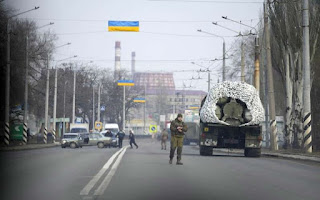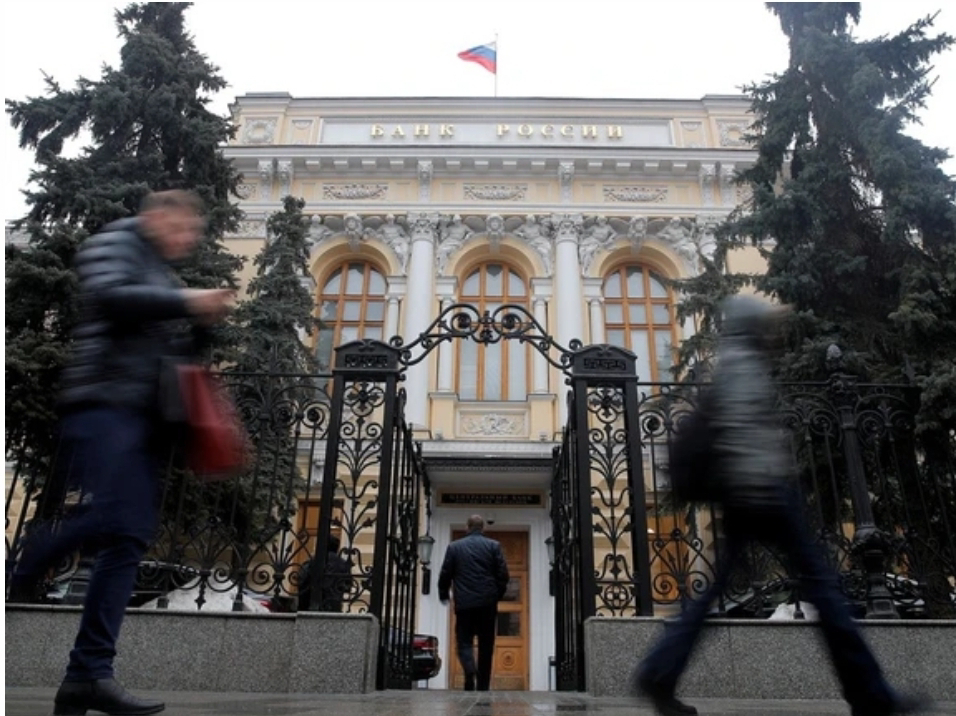NATO berjanji untuk mempertahankan seluruh wilayahnya setelah serangan Rusia.- NATO vows to defend its entire territory after Russia attack.
Opini: Pemulihan kuburan tidak boleh dilupakan begitu cepat 'Kami tidak menginginkan ini': Rusia bereaksi terhadap invasi Ukraina
Rusia melancarkan serangan luas terhadap tetangganya, menghantam kota-kota dan pangkalan dengan serangan udara atau penembakan. Pemerintah Ukraina mengatakan tank dan pasukan Rusia meluncur melintasi perbatasan dan menuduh Moskow melepaskan "perang skala penuh."
Berbicara setelah memimpin pertemuan darurat utusan NATO, Stoltenberg mengatakan aliansi keamanan 30 negara akan terus meningkatkan pertahanannya di sisi timur dekat Ukraina dan Rusia. Dia mengatakan Presiden AS Joe Biden dan rekan-rekan NATO-nya akan mengadakan pertemuan puncak online pada hari Jumat.
"Rusia telah menyerang Ukraina. Ini adalah tindakan perang yang brutal. Pikiran kami bersama orang-orang pemberani di Ukraina," kata Stoltenberg kepada wartawan. "Perdamaian di benua kita telah hancur. Kami sekarang memiliki perang di Eropa, dalam skala dan jenis yang kami pikir milik sejarah."
"NATO adalah aliansi terkuat dalam sejarah, dan jangan salah kami akan membela setiap sekutu terhadap setiap serangan terhadap setiap inci wilayah NATO," katanya di markas besar organisasi itu di Brussels. "Serangan terhadap satu sekutu akan memicu respons dari seluruh aliansi."
Selama pertemuan, Bulgaria, Republik Ceko, Estonia, Latvia, Lithuania, Polandia, Rumania dan Slovakia memicu konsultasi mendesak berdasarkan Pasal 4 perjanjian washington pendiri NATO. Ini diluncurkan ketika "integritas teritorial, kemerdekaan politik atau keamanan salah satu pihak (NATO) terancam."
Stoltenberg mengatakan bahwa NATO telah memutuskan untuk mengaktifkan perencanaan darurat untuk memungkinkan komandan memindahkan pasukan lebih cepat. Dia berbicara tak lama setelah utusan untuk aliansi trans-Atlantik setuju untuk lebih meningkatkan angkatan darat, laut dan udara di sisi timur dekat Ukraina dan Rusia.
"Kami telah memutuskan, sejalan dengan perencanaan pertahanan kami untuk melindungi semua sekutu, untuk mengambil langkah-langkah tambahan untuk lebih memperkuat pencegahan dan pertahanan di seluruh Aliansi," kata para duta besar dalam sebuah pernyataan. "Langkah-langkah kami adalah dan tetap preventif, proporsional dan non-eskalasi."
Lithuania mengumumkan keadaan darurat dalam sebuah dekrit yang ditandatangani oleh Presiden Gitanas Nauseda sebagai tanggapan atas serangan Rusia. Parlemen negara Baltik itu diperkirakan akan menyetujui langkah itu dalam sesi luar biasa Kamis malam.
Langkah itu, yang berlaku hingga 10 Maret, memungkinkan penggunaan dana cadangan negara yang lebih fleksibel dan peningkatan perlindungan perbatasan, memberi penjaga perbatasan otoritas yang lebih besar untuk menghentikan dan mencari individu dan kendaraan di daerah perbatasan.
Anggota NATO Lithuania berbatasan dengan wilayah Kaliningrad Rusia di barat daya, Belarus di timur, Latvia di utara dan Polandia di selatan.
Sementara beberapa dari 30 negara anggota NATO memasok senjata, amunisi dan peralatan lainnya ke Ukraina, NATO sebagai organisasi tidak. Ini tidak akan meluncurkan aksi militer untuk mendukung Ukraina, yang merupakan mitra dekat tetapi tidak memiliki prospek untuk bergabung.
Estonia, Latvia dan Lithuania, bagaimanapun, mengatakan dalam sebuah pernyataan bersama: "Kita perlu segera menyediakan orang-orang Ukraina dengan senjata, amunisi dan jenis dukungan militer lainnya untuk mempertahankan diri serta bantuan dan dukungan ekonomi, keuangan dan politik, bantuan kemanusiaan."
"Tanggapan paling efektif terhadap agresi Rusia adalah persatuan," kata Perdana Menteri Estonia Kaja Kallas di Twitter. "Agresi rusia yang meluas adalah ancaman bagi seluruh dunia dan semua negara NATO."
NATO mulai meningkatkan pertahanannya di Eropa timur laut setelah Rusia mencaplok Semenanjung Krimea Ukraina pada 2014. Ini memiliki sekitar 5.000 tentara dan peralatan yang ditempatkan di sana, tetapi pasukan tersebut telah ditingkatkan dengan pasukan dan peralatan dari beberapa negara dalam beberapa bulan terakhir.
Langkah pertama sekarang adalah mengaktifkan Pasukan Respons NATO, yang dapat berjumlah hingga 40.000 tentara. Brigade darat yang dapat dikerahkan dengan cepat yang merupakan bagian dari NRF – yang terdiri dari sekitar 5.000 tentara dan dijalankan oleh Prancis bersama Jerman, Polandia, Portugal dan Spanyol – sudah dalam siaga tinggi.
Beberapa anggota NATO juga telah mengirim pasukan, pesawat terbang dan kapal perang ke wilayah Laut Hitam, dekat sekutu Bulgaria, Rumania dan Turki. Pentagon juga telah menempatkan hingga 8.500 tentara AS dalam siaga tinggi, sehingga mereka akan siap untuk dikerahkan jika diperlukan untuk meyakinkan sekutu lain.
----------------------------------=============================
Opinion: Grave recoveries must not be forgotten so quickly ‘We don’t want this’: Russians react to the Ukraine invasion.
Feb24, 2022 - 11:14 AM.
BRUSSELS (AP) — NATO Secretary-General Jens Stoltenberg warned Thursday that the military alliance would defend every inch of its territory should Russia attack a member country, as he slammed Moscow for launching a brutal act of war on Ukraine.
Russia launched a wide-ranging attack on its neighbor, hitting cities and bases with airstrikes or shelling. Ukraine’s government said Russian tanks and troops rolled across the border and accused Moscow of unleashing a “full-scale war.”
Speaking after chairing an emergency meeting of NATO envoys, Stoltenberg said the 30-nation security alliance will continue to beef up its defenses on its eastern flank near Ukraine and Russia. He said U.S. President Joe Biden and his NATO counterparts will hold an online summit on Friday.
“Russia has attacked Ukraine. This is a brutal act of war. Our thoughts are with the brave people of Ukraine," Stoltenberg told reporters. “Peace in our continent has been shattered. We now have war in Europe, on a scale and of a type we thought belong to history."
“NATO is the strongest alliance in history, and make no mistake we will defend every ally against any attack on every inch of NATO territory,” he said at the organization's Brussels headquarters. “An attack on one ally will trigger a response from the whole alliance."
During the meeting, Bulgaria, the Czech Republic, Estonia, Latvia, Lithuania, Poland, Romania and Slovakia triggered urgent consultations under Article 4 of NATO's founding Washington Treaty. These are launched when “the territorial integrity, political independence or security of any of the (NATO) parties is threatened.”
Stoltenberg said that NATO has decided to activate emergency planning to allow commanders to move forces more quickly. He spoke shortly after envoys to the trans-Atlantic alliance agreed to further beef up its land, sea and air forces on its eastern flank near Ukraine and Russia.
“We have decided, in line with our defensive planning to protect all allies, to take additional steps to further strengthen deterrence and defense across the Alliance,” the ambassadors said in a statement. “Our measures are and remain preventive, proportionate and non-escalatory.”
Lithuania declared a state of emergency in a decree signed by President Gitanas Nauseda in response to Russia's attack. The Baltic country’s parliament was expected to approve the measure in an extraordinary session later Thursday.
The measure, in effect until March 10, allows for a more flexible use of state reserve funds and increased border protection, giving border guards greater authorities to stop and search individuals and vehicles in border areas.
NATO member Lithuania borders Russia’s Kaliningrad region to the southwest, Belarus to the east, Latvia to the north and Poland to the south.
While some of NATO’s 30 member countries are supplying arms, ammunition and other equipment to Ukraine, NATO as an organization isn’t. It won’t launch any military action in support of Ukraine, which is a close partner but has no prospect of joining.
Estonia, Latvia and Lithuania, however, said in a joint statement: “We would need to urgently provide Ukrainian people with weapons, ammunition and any other kind of military support to defend itself as well as economic, financial and political assistance and support, humanitarian aid."
“The most effective response to Russia’s aggression is unity,” Estonian Prime Minister Kaja Kallas tweeted. “Russia’s widespread aggression is a threat to the entire world and to all NATO countries.”
NATO began beefing up its defenses in northeastern Europe after Russia annexed Ukraine’s Crimean Peninsula in 2014. It has around 5,000 troops and equipment stationed there, but those forces have been beefed up with troops and equipment from several countries in recent months.
A first step now could be to activate the NATO Response Force, which can number up to 40,000 troops. A quickly deployable land brigade that is part of the NRF — made up of around 5,000 troops and run by France alongside Germany, Poland, Portugal and Spain — is already on heightened alert.
Some NATO members have also sent troops, aircraft and warships to the Black Sea region, near allies Bulgaria, Romania and Turkey. The Pentagon has also put up to 8,500 U.S. troops on heightened alert, so they will be prepared to deploy if needed to reassure other allies.


Komentar